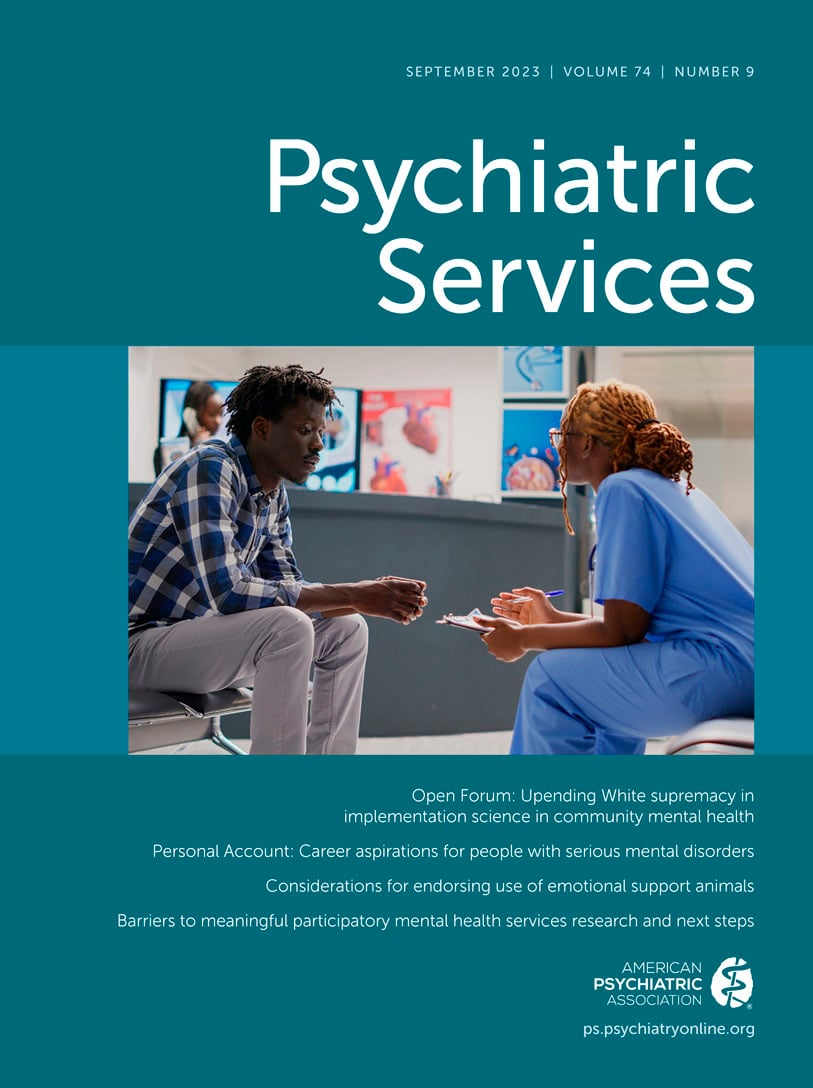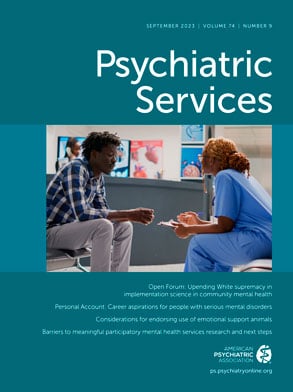Barriers to Meaningful Participatory Mental Health Services Research and Priority Next Steps: Findings From a National Survey
Abstract
Objective:
Methods:
Results:
Conclusions:
HIGHLIGHTS
Range of Involvement in Participatory Methods
Prevalence of Participatory Mental Health Services Research
U.S.-Based Concerns Regarding Tokenism in Involvement
Service User Research Roles in the United States
Institutional Support for Participatory Research
Methods
Overview
Project Leadership and Coauthor Positionality
Survey and Interview Instruments
Survey Administration
Results
Sample
| Full survey (N=98) | Open-ended items (N=78) | |||
|---|---|---|---|---|
| Characteristic | N | % | N | % |
| Race-ethnicity | ||||
| White | 73 | 74 | 60 | 77 |
| Black | 11 | 11 | 7 | 9 |
| Hispanic-Latinx | 4 | 4 | 2 | 3 |
| Asian | 7 | 7 | 6 | 8 |
| Native American or American Indian | 2 | 2 | 2 | 3 |
| Middle Eastern | 1 | 1 | 1 | 1 |
| Gender | ||||
| Cisgender woman | 62 | 63 | 51 | 65 |
| Cisgender man | 12 | 12 | 10 | 13 |
| Nonbinary | 5 | 5 | 5 | 6 |
| Two spiriteda | 2 | 2 | 1 | 1 |
| Other | 1 | 1 | 6 | 8 |
| Missing | 16 | 16 | 5 | 6 |
| Education | ||||
| High school or some college | 12 | 12 | 11 | 14 |
| Bachelor’s degree | 9 | 9 | 8 | 10 |
| Master’s degree | 21 | 21 | 20 | 26 |
| Current doctoral student | 5 | 5 | 5 | 5 |
| Ph.D. or M.D. | 26 | 27 | 24 | 31 |
| Missing | 25 | 26 | 10 | 13 |
| Role in participatory projects | ||||
| Stakeholder only | 40 | 41 | 27 | 35 |
| Researcher only | 33 | 34 | 30 | 38 |
| Both researcher and stakeholder experience | 25 | 26 | 21 | 27 |
| Type of stakeholder experienceb | ||||
| Service user only | 20 | 32 | 13 | 28 |
| Family only | 6 | 10 | 6 | 13 |
| Service user plus family | 2 | 3 | 1 | 2 |
| Family plus provider | 1 | 2 | 1 | 2 |
| Service user plus provider | 23 | 37 | 18 | 39 |
| Provider only | 1 | 2 | 1 | 2 |
| Service user plus family plus provider | 9 | 14 | 5 | 11 |
| Other | 1 | 2 | 1 | 2 |
| Psychiatric experiencec | ||||
| Psychiatric diagnosis (any lifetime) | 81 | 83 | 66 | 85 |
| Never disclosed in a research context | 19 | 19 | 16 | 21 |
| Disclosed in some but not all projects | 33 | 34 | 26 | 33 |
| Disclosed in all research projects | 29 | 30 | 23 | 29 |
| Disclosure data missing | 0 | — | 1 | 1 |
| Psychosis diagnosis | 8 | 8 | 8 | 10 |
| Involuntary hospitalization | 18 | 18 | 13 | 17 |
| Voluntary hospitalization | 27 | 28 | 22 | 28 |
| Homelessness | 18 | 18 | 15 | 19 |
| Arrest | 19 | 19 | 17 | 22 |
| Family or caregiver experience | 36 | 37 | 26 | 33 |
Perceived Barriers: Close-Ended Items
| Problem score (M±SD) | Perceiving barrier as large or very large problem | ||
|---|---|---|---|
| Barrier | N | % | |
| Related to community relationships and understanding | |||
| Community members not seeing research as a priority | 3.4±1.1 | 43 of 90 | 48 |
| Community members having low levels of trust in researchers | 3.5±1.2 | 43 of 90 | 48 |
| Projects failing to benefit the community in a meaningful way | 3.6±1.2 | 56 of 91 | 62 |
| Basic research goals being met, but the project does not result in meaningful output (e.g., the project did not benefit the community or bring about community change) | 3.8±1.2 | 56 of 90 | 62 |
| Related to direct stakeholder involvement | |||
| Research teams involving stakeholders primarily to check a box, rather than being genuinely invested in the priorities of these stakeholders and what they have to say | 3.6±1.3 | 53 of 91 | 58 |
| Administrative policies limiting the extent to which nonuniversity affiliates can be involved in the research process (e.g., institutional review boards limiting access to data) | 3.7±1.2 | 52 of 85 | 61 |
| Researchers undermining or underestimating the contributions that nonresearchers can make to the research project | 3.7±1.3 | 58 of 91 | 64 |
| Not including stakeholders or stakeholder communities that come from diverse backgrounds | 3.8±1.3 | 62 of 90 | 69 |
| Lack of opportunities for stakeholder leadership (e.g., leading analyses, being lead author of manuscripts) | 3.8±1.1 | 55 of 88 | 63 |
| Structural | |||
| Lack of program or university support for the additional effort and time involved in participatory research | 3.6±1.3 | 45 of 83 | 54 |
| Lack of explicit support or encouragement for stakeholder involvement from major research funding entities | 3.6±1.3 | 52 of 87 | 60 |
| Lack of support for compensating stakeholder involvement in grant writing or preparatory activities | 3.9±1.1 | 58 of 85 | 68 |
| Lack of training in participatory methods, particularly among graduate students, fellows, and trainees | 3.9±1.2 | 63 of 85 | 74 |
| Lack of dedicated funding for stakeholder-led research projects (including service user stakeholders) | 4.0±1.1 | 65 of 86 | 76 |
| Lack of sensitivity on the part of researchers | |||
| Conducting research in ways that unintentionally harm or retraumatize stakeholders who have lived experience with the research topic | 3.4±1.3 | 46 of 92 | 50 |
| Researchers using language that stakeholders might disagree with or find offensive | 3.4±1.2 | 50 of 91 | 55 |
| Using medical, clinical, or academic terms that are hard for nonresearchers to understand | 3.5±1.1 | 51 of 92 | 55 |
Additional Barriers: Open-Ended Items
Most Important Next Steps for the Field: Open-Ended Items
| Theme | N | % | Example quotations |
|---|---|---|---|
| Authentically center lived experience and reduce tokenism in research | 20 | 26 | For the most part, I see researchers engaging in participatory research in very superficial ways, and it’s rare to see anything like true leadership except when the lead researcher . . . has lived experience. [Practice] deep listening by all and centering those with lived experience more than those who are researchers only. |
| Increase accountability to community stakeholders | 16 | 21 | Stakeholders must be involved from the start. People must feel invested in the process. . . . Also, results should bring changes that are sustainable. Prioritize beneficial outcomes for individuals and the community. |
| Increase structural incentives or requirements for stakeholder inclusion in research | 13 | 17 | Universities need to reward researchers (through hiring, promotion, etc.) who involve community partners, because the process may take longer than traditional research. Consider changes to institutional review boards to eliminate policy-based barriers to thoughtfully engaging external stakeholders in the research process. |
| Increase investment by funding entities and facilitating compensation for community researchers | 16 | 21 | There needs to be commitment from major funders, such as the NIH. Researchers should be expected to involve stakeholders in the majority of health services research. Funding agencies [need to] prioritize nonacademic stakeholder participation in CBPR [community-based participatory research] by providing sufficient funding and training. Federal funding grants [should] require stakeholder participation, training, and [compensation for] involvement. |
| Ensure training and continuing education for researchers and stakeholders | 25 | 33 | [Provide] education for stakeholders on research; vice versa, [offer] education on best practices for engaging stakeholders with lived experience. [There should be] more widely available training in best practices for participatory research. All disciplines would benefit from being more thoughtful and critical in their epistemological training, their training in the history of science, and knowledge production and knowledge exclusion and from engaging in a lot of self-reflection about their own power and exclusionary practices. |
| Increase outreach to stakeholder communities | 17 | 23 | Better outreach so that there are more opportunities and awareness of opportunities for stakeholders to become involved. More promotion in diverse communities and efforts to ensure that those with lived experience are the ones front and center in said promotions. |
Discussion
Implications
BOX 1. Recommendations for policy and practice to strengthen uptake of participatory mental health services research in the United States, by stakeholder or entity
Funders
Professional Associations
Universities and Research Centers
Researchers and Research Groups
Limitations
Conclusions
Acknowledgments
Supplementary Material
- View/Download
- 269.21 KB
References
Information & Authors
Information
Published In
History
Keywords
Authors
Author Contributions
Competing Interests
Funding Information
Metrics & Citations
Metrics
Citations
Export Citations
If you have the appropriate software installed, you can download article citation data to the citation manager of your choice. Simply select your manager software from the list below and click Download.
For more information or tips please see 'Downloading to a citation manager' in the Help menu.
View Options
View options
PDF/EPUB
View PDF/EPUBLogin options
Already a subscriber? Access your subscription through your login credentials or your institution for full access to this article.
Personal login Institutional Login Open Athens loginNot a subscriber?
PsychiatryOnline subscription options offer access to the DSM-5-TR® library, books, journals, CME, and patient resources. This all-in-one virtual library provides psychiatrists and mental health professionals with key resources for diagnosis, treatment, research, and professional development.
Need more help? PsychiatryOnline Customer Service may be reached by emailing [email protected] or by calling 800-368-5777 (in the U.S.) or 703-907-7322 (outside the U.S.).

